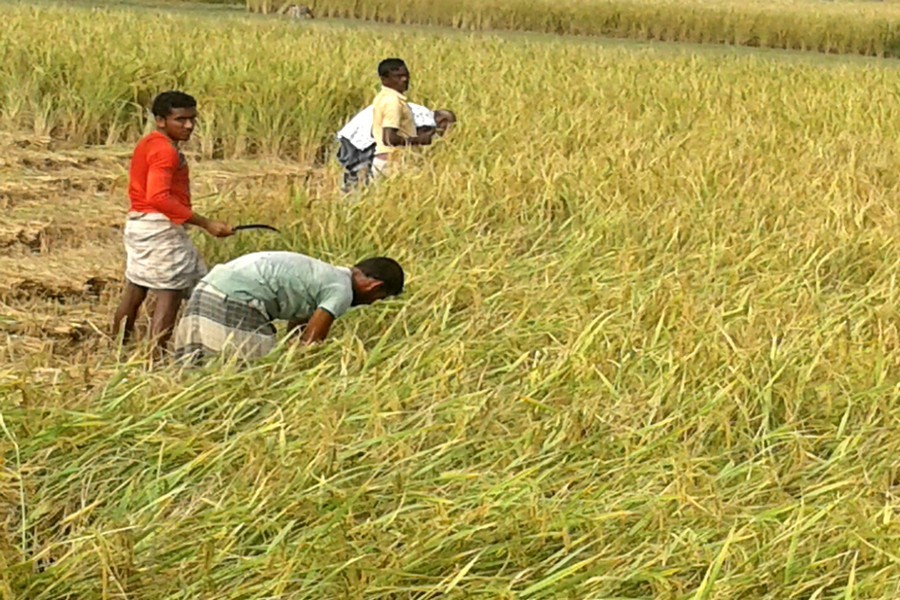Farmers across the country are now busy harvesting their Boro rice crop. After the setback they had suffered due to two consecutive floods last year, the nature has blessed them with a plenty of Boro output this year, as if, to compensate for the last year's loss.
With a record Boro harvest, farmers should have been very happy. But they are not, for the prevailing market price of paddy is not even enough to meet their cost of production.
This has been a perennial problem for the Bangladesh's farming community. They usually get fair prices for their commodities when the production is scanty and the opposite does happen in the case of a bumper output. In fact, farmers have never been certain either about production of crops or their prices. Nature decides the fate of the first one and, as far as the prices of their produce are concerned, 'paikers' (middlemen) and millers remain the key determinants.
The government's food procurement drive that is put in place during the harvest time of both Aman and Boro rice, as claimed by the government, is aimed at relieving the growers of uncertainty over fair price for their two major rice crops. The government does every time set a procurement target and fix rates for both paddy and rice taking into cognizance the cost of production of the same at the growers' level.
But the rice farmers are deriving little benefit from the state food procurement programme due to widespread corruption, other irregularities and systemic flaws in it. Its actual beneficiaries are a section of unscrupulous food directorate officials and millers.
For instance, the government on April 08 last announced the procurement programme for Boro rice. Under the programme, the government is set to procure 900,000 metric tonne (MT) Boro rice and 150,000 MT paddy this year at Tk 38 and Tk 26 a kilogram (kg) respectively. The procurement was scheduled to start on May 04 last. But the drive reportedly has not yet begun in many areas of the country.
The farmers who have already harvested their rice crops, particularly in haor areas, have no other option but to sell their produce right from the rice field to 'paikers', who are actually engaged by millers or large rice traders. The growers in haor areas are selling their paddy at Tk 15 to 16 a kg. However, in areas having better communication network, farmers usually get higher prices.
The hard fact is that the beneficiaries of the state procurement drive are the millers who procure paddy from growers at lower prices and after necessary processing sell the same to the government at prices fixed by the latter. However, the food department officials engaged in procurement manage some undue pecuniary benefits from millers.
Last year, the government's food procurement drive in the domestic market suffered badly as the market prices of rice skyrocketed. Since the official procurement prices for both paddy and rice were well below those prevailing in the market at that time, millers did fail to keep their commitment in relation to supply of rice to the government. Under the circumstances, the ministry of food had to send a number of delegations to some major food exporting countries and strike a number of rice import deals.
It transpires from the state of affairs with the official food procurement programme that the government's sole objective is now procuring food. It bothers little about the source of procurement. The system now being followed in the procurement drive does not anyway benefit growers since during the periods of better rice harvests, the incentives are not passed on to them (growers) by millers.
While fixing the procurement prices of Aman and Boro rice and paddy, the ministry of food with the help of the ministry of agriculture takes into cognizance the cost of production at the growers' level. But what is the use of making this exercise, if the items are not collected from growers directly? The government cannot expect millers to pass on the price benefit to growers.
A private television channel last Sunday aired the plight of rice growers in haor areas. The latter said that they had no option but to sell paddy to the 'paikers' at prices much lower than their cost of production since they cannot afford milling of paddy.
So, if the government is really honest about protecting the interests of the farming community, it should devise an effective mechanism for food procurement. It is hard to avoid some wastage and misappropriation. But the primary objective of the programme should be to benefit the small and marginal farmers, none else.


